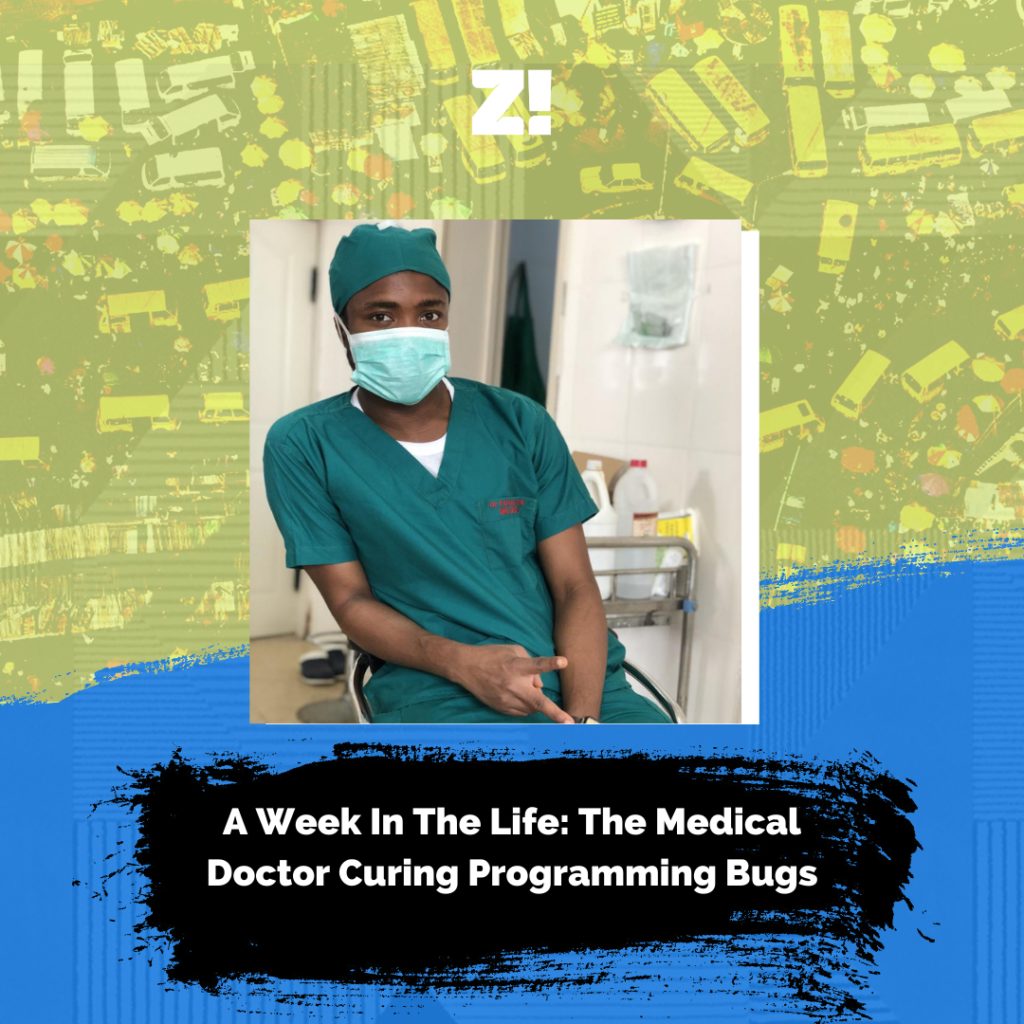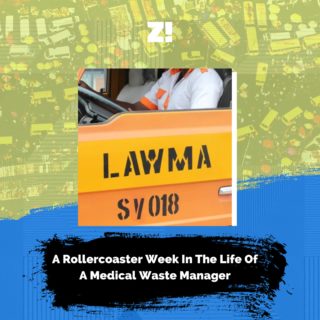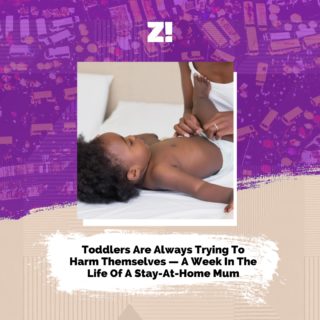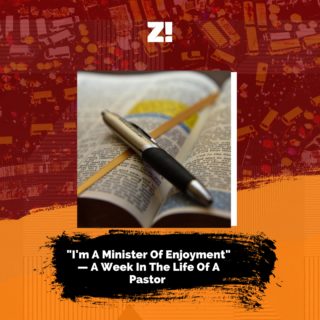“A Week In The Life” is a weekly Zikoko series that explores the working-class struggles of Nigerians. It captures the very spirit of what it means to hustle in Nigeria and puts you in the shoes of the subject for a week.
The subject of today’s “A Week In The Life” is a Medical doctor. He talks about the worst year of his medical career, how Nigeria kills dreams, and why he’s aggressively learning to code.

MONDAY:
I wake up by 5:30 a.m. because I have to pray and get ready for work. I like to get to work early because punctuality is a virtue. After prayers,, I scroll through messages on my phone to see if I missed anything from the night before. I reply to a few messages, then I go through the ritual of brushing, bathing and general grooming, and I’m ready for the day.
I work as a doctor in a small private clinic. When I resume at the hospital, the doctor on the night shift hands over a patient that was on admission over the night. I introduce myself and go over the treatment plan. There is no other patient on admission, so I sit and wait for outpatients. I’m grateful for this job because I don’t see more than 5 – 10 patients in a day. It’s rare, as a doctor, to do a job that gives you free time.
Thankfully, I’m with my laptop, so I decide to write some code. I inform the nurse that I’ll be in the doctor’s room if she needs me, and my day really begins.
TUESDAY:
The residency program for doctors in this country is crap. I considered doing residency and even wrote the first qualifying exam, but thank goodness I noticed a trend that changed my orientation on time.
A few months ago, each unit had ten doctors, and even that wasn’t enough. But now, you have one doctor doing the work of ten people. So you realise that the person is overworked, underpaid and underappreciated. This is quite discouraging.
I still think that my house job year was one of the worst years of my life because it was a really long year. There were days I thought I was going to die because of the workload. I don’t consider myself a lazy person, but it was overwhelming even for me. It was just too much work.
I’ll never forget a weekend call that broke me. Typical weekend calls last for 48 hrs — you resume at 8 a.m. on Saturday and leave the hospital by 4 p.m. on Monday. I remember that I was in one extremely stressful unit and by 9 p.m. on Monday, we hadn’t left the hospital. I’ll never forget thinking I was going to die as we moved to the last patient. My eyes were closing as I struggled to keep up with my senior colleagues. At one point, I didn’t even realise I had started swaying until I felt a hand on my shoulder. It was an elderly matron who had noticed I was about to fall that stopped me. She got me a chair, sat me down and sent for a bottle of coke for me. For the first time since that day started, someone showed me empathy. It’s funny how people are so focused on getting help that they don’t realise that even the helper needs help. That singular act was the kindest thing anyone did for me during that house job year.
I think that was one of the straws that made me realise that this country is not it and any hope for a change in the healthcare sector is light-years away.
The thought of residency being worse than house job is scary, and that’s why a lot of doctors are investing in jaapa. I hope that journey will be more straightforward and rewarding. Today, I’m going to spend my time dreaming of a healthcare system that’s not trying to kill me.
WEDNESDAY:
The hardest part of being a doctor is societal expectations. People expect you to dress a certain way, act in a certain manner and then go down the traditional path of residency.
Anyone who diverges from this path — I have friends exploring other fields — is considered a failure. In a way, medicine has a way of indoctrinating you to believe that you can’t be anything without it. And that doctrine is one of the hardest things to break free from. I think once many doctors realise that there’s much more outside of the profession, the better they’ll be for it. I’m hoping that when we jaapa, our passion will be reignited. I think for many people, passion died during the house job year, and they’re just winging it until they get out.
Learning to code started out as a result of curiosity and a lack of options. I remember reading a book that changed my perspective. The book talks about how people with two high in-demand skills can give more value, and how they own the future. These people are able to identify opportunities for innovation in one field and then bring knowledge from another completely different field to help in problem-solving. The unique advantage they have is that someone in either field would either be unable to see those unique problems or would lack the skills to solve them.
After reading the book, I started learning to code as part of my new year resolution. I’m trying to see if I can use technology to solve medical problems. Two months to the end of 2020, and I’m grateful for how far I’ve come. I can’t wait to say it’s been one year since I started learning to code.
THURSDAY:
Today, I can’t sleep. I’m tossing and turning. I’ve been dreaming of a bug that just won’t allow my code to be great. I dreamt of the solution to the problem and that’s what woke me up.
For something that started out of curiosity, I’m hooked. I find myself waking up in the middle of the night to solve some problem. I’ve lost count of how many times I have found myself dancing in the middle of the night alone, with no music playing, because I successfully fixed a bug in my code.
My proudest moment still remains my first project. I was at work one day when a child was brought in the middle of the night. The child had seizures, was dehydrated and unconscious. Being the only doctor [with only a nurse] in the clinic, I had so many responsibilities. I had to monitor vital signs, set intravenous access [a line] and calculate the amount of fluids to give the child. Even though the calculation wasn’t hard, I couldn’t help but think of how to automate the task so that the next time I had a similar patient, I’d have one less task to perform. I wanted a way to input some values and get the amount of fluid to give. This made me build my first project — a calculator to determine the amount of fluid to give to a dehydrated child.
After building this, I innocently put in on Twitter because I felt like one or two people would relate. In less than six hours, I had over two thousand views. I was shocked because I don’t think I’ve ever had anything that had more than 10 views. It was a humbling experience which has prompted me to build a lot more medical applications.
I’m grateful for the medical community on Twitter, and I’m glad to be a part of it. I’m also grateful for my support system, most notably my girlfriend who’s always there for me.
I’m just here thinking about how she’s been my number one supporter on this journey. She has supported me with time, money and encouragement. In fact, my plan for today is simple: I’ll start calling her sugar mummy.
FRIDAY:
Today, I made $100 from my first coding job. This may not seem like a lot until you realise that it is one third the average salary of a doctor in Lagos. It’ll take 10 full working days for a doctor to earn that amount, and I did that in six hours. More than anything, this has shown me that there’s some prospect in coding. We die here.
I’m not going to white-wash it; coding is hard. It’s frustrating. It makes me feel clueless, stupid, dumb. It’s ridiculous that because you miss one semicolon, your project is breaking. However, if you stick through the difficult times, it gets easier and you begin to gain some proficiency. I’m lucky because I have a good support system, and I’ve also been a recipient of kindness from helpful strangers.
I’m going to keep pushing it — medicine and technology. I see a future where I’m running my own tech startup. At the back of my mind, I’m hoping that it’s not within this country because Nigeria has a way of killing your dreams. And because medicine in Nigeria is a jealous lover; it’s almost impossible to combine anything with it, especially if you’re going through the path of a residency programme. Outside this country, you can have a life outside of medicine, the long hours and poor pay, and that’s all I’m hoping to have. Is that too much to ask for?
Check back every Tuesday by 9 am for more “A Week In The Life ” goodness, and if you would like to be featured or you know anyone who fits the profile, fill this form.




